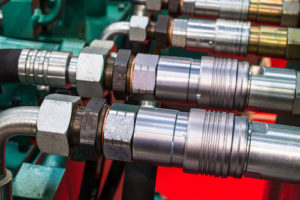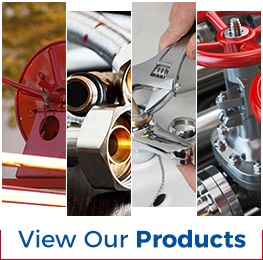
Simply put, hydraulic hoses are used to transfer water to hydraulic equipment. Hydraulic machinery that requires these hoses include pallet jacks, wheelchair lifts, conveyers, wood splitters, and positive displacement pumps. As one could imagine, having reliable hoses for hydraulic equipment is important for its associated machinery to operate effectively. However, it’s not just about having machinery work effective. Most importantly, that machinery should be safe to work with
Whether you rented your current hydraulic hoses, purchased used ones, or have had your current hoses for about 10 years, it will be critical that you thoroughly inspect your current hoses for wear and tear to prevent serious injury. Even disregarding age and frequency of use, observing your current hoses for harm is imperative for your and your employees’ safety.
Signs Your Hydraulic Hose is Damaged
If your hydraulic hoses feature cracks or cuts, corroded fittings, kinks or twists, flattened areas, horse fitting slippage, stiffness, or leaks, immediately shut down your hydraulic equipment. These are signs that your hydraulic hose is not safe to use.
Hydraulic hoses should be inspected frequently to ensure optimal safety prior to operating the associated equipment. Although worn-out hydraulic hoses can sometimes be repaired, it’s vital that a professional checks your work if you repair the hose yourself or that you replace the damaged hose(s) altogether.
Risks of Using a Worn-out Hydraulic Hose
There are many risks that can come with using a damaged hydraulic hose. Hydraulic fluid leaking from a hose can be incredibly hot, and in turn, can burn your skin and may even cause poisoning, serious infection, or even death if the fluid penetrates through your or your employee’s skin.
Likewise, leaks from hydraulic hoses can create a potential for slips and falls, increase the risk of a fire, or even damage other nearby equipment or materials due to the hose’s high pressure. On top of that, hydraulic hose leaks can cause environmental hazards as hydraulic fluid contains chemicals.
The negligence regarding replacing worn-out hydraulic hoses can result in potential fines from the Environmental Protection Agency (EPA) or even the closure of your plant. If someone else gets damaged as a result of your hydraulic hose failure, there may be a potential for a lawsuit.
Finding Quality Hydraulic Hoses You Can Trust
Avoiding expensive damage, serious injury, and hefty fines by using a faulty hydraulic hose is as simple as choosing not to use it. Whether it’s your actual hydraulic hose that necessitates replacement or a wrong fitting that requires replacement, ASJ Industrial Hose & Fittings Inc. is here to help you find the right hydraulic hoses and fittings you require.
At ASJ Industrial Hose & Fittings Inc., our nearly four decades of experience makes us your number one choice for high-quality, commercial hydraulic hoses. Give us a call at (951) 735-1351 for more information on our commercial hoses and fittings.



 Phone:
Phone: